Analysis of the most competitive league in Europe - Premier League, La Liga, Bundesliga
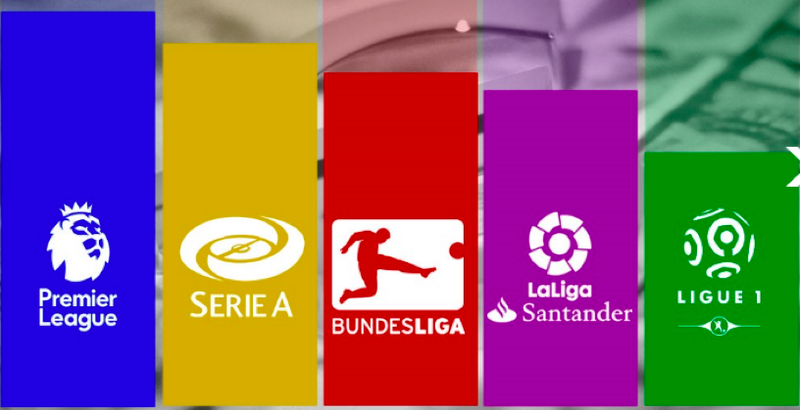
I thought I'd expand on a point that was raised in the comments section of one of my recent blogs by @jon.bonomo in regards what constitutes a competitive league.
My assertion was that the Bundesliga is a little bit boring and essentially uncompetitive when you consider that Bayern are now cruising towards an 8th straight title. Jon suggested that things weren't quite that black and white and that other top leagues had even greater inequality within them.
Here in response is my analysis of the Premier League, The Bundesliga and La Liga over the past decade in a bid to instigate even further discussion.
I'll start with a measure of competitiveness that Jon himself suggested by comparing the points difference between the top team in the league and the 2nd placed team in the league. However, to make it a fairer comparison between leagues where there are different numbers of teams and therefore games played, I've used the difference between average points per game won as opposed to just the total points.
For example, in 2012 Manchester United & Manchester City both won 89points which across a 38 game season meaning they averaged 2.34 points every game (89/38). The difference in points per game that each side won that year was 0 with City famously winning the league with what was essentially the last kick of the season. By comparison in 2013 Bayern Munich acquired 91 points over a 34 game season (2.67 points per game) compared to runners-up Dortmund who managed just 66 points (1.94 points per game) that's a massive difference of 0.73 points more per game that Bayern won on average across the season compared to their closest rivals.
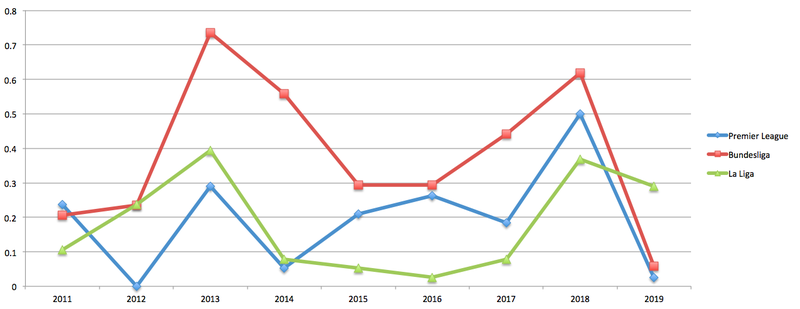
As you can see, throughout much of the last decade the Bundesliga has struggled to produce tight finishes at the top of the league particularly in comparison to the other 2 leagues. Perhaps the most sustained period of close contests at the very top comes in the period 2014 to 2017 when Messi and Ronaldo inspired Barca and Real sides slogged it out at the top of La Liga.
Does this mean La Liga is the most competitive of the top leagues in Europe?
Jon suggested a good measure of competitiveness might be to look at the points difference between the top team in the league and the bottom team in the league. I'm not sure I agree on that being a particularly effective indicator of competitiveness as it completely ignores what was happening in the rest of the league and we all know that every league around the world throws-up the occasional no-hoper of a team like Huddersfield or Nurenburg in 2019 neither of whom made it past the 20 point mark in their respective leagues that year. However, elsewhere in the same league season (as shown above), we saw great battles for dominance at the top of those divisions.
Perhaps a better indication of competitiveness within and between leagues is to see how many points the top side was able to win each year. That is what the below graph shows as an average points per game
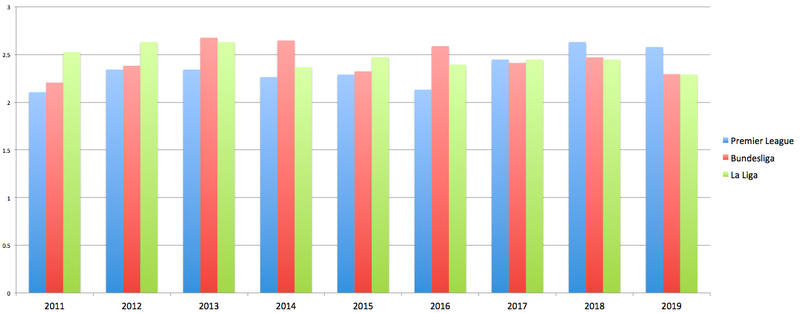
As you can see, particularly in the first half of the decade, the Bundesliga and La Liga champions were almost entirely dominant suggesting a massive gap not just between them and the league's bottom teams but them and pretty much everyone else!
That trend however, has begun to shift in the last few seasons with Manchester City's record breaking seasons of 2018 and 2019 requiring Premier League clubs to dominate their respective league more than they did in the years leading-up to that. Unless Liverpool collapse in spectacular fashion upon the resumption of the 2020 season we are likely to see this trend continue in the EPL.
So does that mean the Premier League has become less competitive over the last few seasons? At least within two of the last four years, the stats above certainly suggest as much. However, the Premier League can always point to the fact that in the same period (and assuming Liverpool win the league this year) that it has produced 3 unique league winners in that same 4 year spell; more than either of the other leagues.
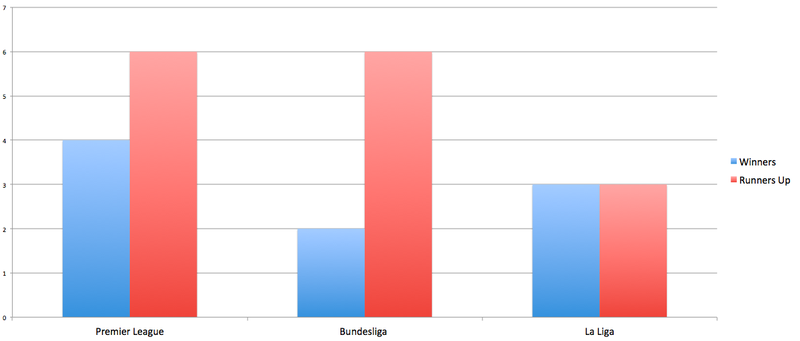
In fact, as far as unique winners go this decade, the Premier League is comfortably ahead of either the Bundesliga or La Liga as the graph above shows. The Bundesliga does at least close the gap when considering sides who have finished runner-up suggesting the race for the title of "best of the rest" is a little more entertaining in Germany.
Spain meanwhile has been completely dominated by Barcelona, Real Madrid and Atletico Madrid to the point that no other side has finished in the top 2 yet this decade. That stat alone must cast serious doubts as to the competitiveness of La Liga as a whole. It is well known that the way clubs like Barca and Real are set-up as legal entities within Spain gives them a significant financial advantage over everyone else in the league and so it's perhaps not surprising to see that they have formed a duopoly compared to Bayern's monopoly in Germany. On this measure, the Premier League can at least lay claim to being the most unpredictable of the 3 leagues on a season by season basis.
As touched on above, money is no doubt a massive factor in the competitiveness of teams within a league. Again with Real Madrid and Barcelona sitting atop Forbes rich list for clubs 2020, it's no surprise to see them continually pilling up the silverware in domestic competitions. Bayern are miles ahead of Dortmund in the financial stakes with the Munich based giants worth nearly 5 times as much as their perennial title challengers.
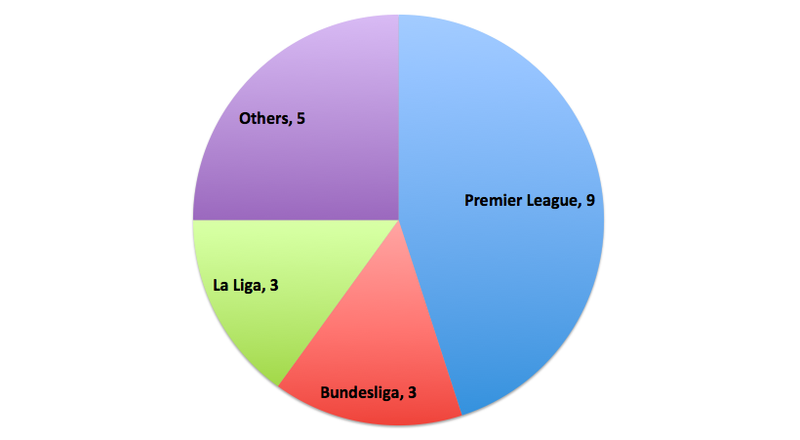
By comparison English clubs financial clout is more spread out and they can boast almost half of the 20 richest clubs in the world meaning that buying success on a season by season basis has proven very difficult as demonstrated by the fact that only Man City who have spent huge sums of cash over the last 10 years have managed to defend a title this decade.
That vast financial imbalance that exists in Spain and Germany leads to situations whereby the true powerhouses are capable of simply vacuuming up talent from any other club that could potentially threaten their dominance. That much is particularly true in Germany where Bayern Munich have regularly raided Dortmund for their top players, strengthening their own side while simultaneously plunging the contender into a state of re-building. Can Dortmund build on their recent success by adding to a squad that contains the likes of Sancho and Haaland or will it be another case of 2 steps forward and 1 step back once the big clubs come knocking for their prize assets?
Conversely, It is rare to see clubs within the Premier League's "Big 6" transfer players to one another and even rarer still to see one of them manage to financially strong-arm another out of a player that they'd rather keep. You'd be hard-pressed to claim that the EPL is financially fair but at the same time the relative spread of wealth has prevented one or two sides from dominating the league for too long within the last decade.
There are many ways in which you could define competitiveness, this analysis has focused mainly on competition at the very top of the league but there could be other stats that might be used in an attempt to measure it. Equally, there could be other leagues that you think merit a mention alongside the ones mentioned above. Let me know in the comments what you think?
Comments